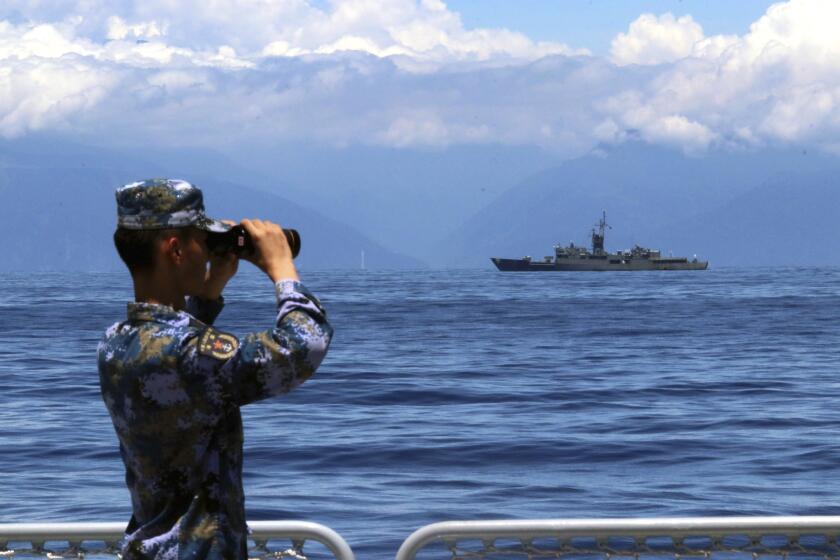Ukraine Floats Plan for Commonwealth of Slavic States : Independence: A loose confederation with Russia and Belarus would benefit all three former Soviet republics, President Kravchuk says.
- Share via
MOSCOW — Ukrainian President Leonid M. Kravchuk proposed Friday that Russia and neighboring Belarus join with his new nation to form a Slavic commonwealth as the old Soviet Union continues to disintegrate.
Kravchuk, riding the crest of nationalism in Ukraine, which voted Sunday for independence, would bring together three of the 15 former Soviet republics in a loose confederation that could ensure that their economic ties remain intact.
The Ukrainian president, elected in Sunday’s vote, said he would discuss the idea with Russian Federation President Boris N. Yeltsin when they meet today and Sunday with Stanislav Shushkevich, chairman of Belarus’ Parliament, at a country estate near Brest on the Soviet-Polish border.
Their discussions will likely shape the meeting, scheduled for the Kremlin on Monday, with Soviet President Mikhail S. Gorbachev and Nursultan A. Nazarbayev, president of Kazakhstan in Soviet Central Asia, on whether to proceed with efforts to hold the remaining Soviet republics together in any kind of union.
Kravchuk’s proposal, reported after a discussion in Kiev, the Ukrainian capital, with a special German envoy, could be the lead that Yeltsin has been looking for in his efforts to fashion a confederation out of the remnants of the Soviet Union.
Although few details were available on Kravchuk’s proposal, he spoke during his election campaign of a union of former Soviet republics modeled on the European Community--each nation independent and sovereign but cooperating in areas, primarily economic, where they see clear benefits.
The union, as Kravchuk has discussed it, would be based primarily on multilateral and bilateral agreements and would be so loosely structured as to have more a coordinating center than a central government; it perhaps would have its political headquarters outside Moscow.
The Kravchuk proposal, as reported from Kiev, would unite the three Slavic republics, much as Russian writer Alexander I. Solzhenitsyn proposed in September, 1990, on the basis of their shared heritage, cultural ties and similar languages. This would be a confederation of more than 210 million people.
But the union apparently would exclude the troubled southern republics of Armenia, Azerbaijan and Georgia, Moldova on the Romanian border and probably all five Central Asian republics; there would be pressure to include Kazakhstan, a vast region with as many Russians as Kazakhs.
When Solzhenitsyn put forward his idea almost a year ago for a union of Russia, Ukraine, Belarus and northern Kazakhstan as part of a broader plan for Russia after the Soviet era, most leaders here rejected it out of hand. Some commentators called it racist for its exclusion of Central Asians and the Caucasian nations.
But Solzhenitsyn’s argument was that Slavs have been together historically and should remain together. Pan-Slavism, a uniting force in eastern and southern Europe over centuries, remains strong here, echoing in the frequent comments of both Gorbachev and Yeltsin that they cannot conceive of Russia without Ukraine.
Yeltsin has sought a much looser confederation than that proposed by Gorbachev in a new treaty under discussion. He wants as small a central structure as possible, with each republic responsible for paying its own way. Like Kravchuk, Yeltsin favors direct agreements among republics.
If Yeltsin and Kravchuk could agree on the shape of a new union linking their republics and Belarus (formerly Byelorussia), it would largely determine what emerges from the ruins of the Soviet state.
Yeltsin had sent a congratulatory telegram to Ukraine’s Parliament on Thursday when it proclaimed the republic’s independence, expressing his hope that the “two brotherly, Slavic republics” would continue their close cooperation. But Yeltsin said his initial conversations with Kravchuk after the referendum were discouraging.
Kravchuk has vowed not to lead his newly independent nation into any union dominated by Moscow, but Yeltsin has said that Russia will join a new union only if Ukraine does.
“We cannot sign the Union Treaty and break with Ukraine, with which we are linked for a millennium,” Yeltsin said Friday as he left for Minsk, the capital of Belarus.
More to Read
Sign up for Essential California
The most important California stories and recommendations in your inbox every morning.
You may occasionally receive promotional content from the Los Angeles Times.










